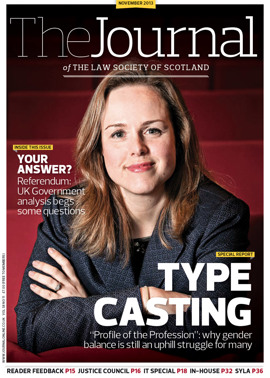You pay your money

Expenses
In Digby Brown v Moore, Edinburgh Sheriff Court, 3 May 2013, one solicitors' firm sued another for legal fees. Before the sheriff principal there were two issues, one relating to jurisdiction and the other to modification of the expenses awarded to the pursuers.
On jurisdiction, there was no need to reiterate formulaic averments when it was obvious from averments where the obligations on both parties were centred. On expenses, the sheriff had confused a client's right to taxation with a solicitor's obligations in respect of his business account. A solicitor did not require to have his account taxed unless requested to. Accordingly, there was no requirement in every action for payment of a business account to have that account taxed. It was a matter within the court's discretion. If the client wished the account taxed, it should be taxed unless there was good reason for refusing that request. In the present case, the level of the account was never challenged and there was no requirement to have it taxed. Modification of expenses was inappropriate.
Lawson v Sabre Insurance Co 2013 GWD 30-599 (2 August 2013) was an action for reparation following a road accident. The pursuer had sought the defenders' agreement to handle the claim in terms of the voluntary pre-action protocol. The defenders admitted liability and offered to negotiate on production of medical and other evidence, and to deal with expenses on the basis of the chapter 10 scale relating to the former General Table of Fees. The pursuer refused to accept chapter 10 expenses and raised the action. Three months later, a tender was lodged which was accepted. On the defenders' motion, Sheriff Murray granted a modification in expenses.
The sheriff considered that the pursuer's agents had not considered whether chapter 10 would have provided adequate remuneration, having concentrated on the issue of expenses rather than quantum, which was the only live issue. The defenders had also been inflexible and unreasonable, and appeared determined to pay minimal expenses. Use of the protocol, however, was not mandatory. Modification was appropriate to mark the court's displeasure at the case having to be raised.
An alternative view was expressed in an informal and unreported note in Durie v Sabre Insurance Co, Perth Sheriff Court, 27 June 2012, that the pursuer had acted reasonably in similar circumstances. The defenders had not examined the pursuer, as they could have done, to enable them to make an offer once they were in possession of the medical report. They had clearly expected the pursuer to do all the running without any reciprocal concession regarding the protocol. The pursuer was thus entitled to raise the action without disclosure. In short, you pay your money, you make your choice!
In Wilson v Wilson, Edinburgh Sheriff Court (22 April 2013), Sheriff Principal Stephen reiterated that the "expenses follow success" principle should not be applied with the same vigour in matrimonial disputes. Refusing a motion for sanction for counsel, she noted that the proof had been conducted by experienced solicitors, and the grounds of appeal, which had been professionally drafted although the appellant represented himself, covered issues arising from the evidence.
In M, Petr [2013] CSOH 160 (3 October 2013) Lord Doherty confirmed that a party who had obtained cover for work of an urgent nature in terms of reg 18 of the Civil Legal Aid (Scotland) (Regulations) 2002 was not a legally-assisted person for that work if no legal aid certificate was subsequently issued. The party thus did not have any right to modification of an adverse award of expenses.
Caution for expenses
In Kennedy-Stewart v Kennedy-Stewart 2013 GWD 31-613 (26 August 2013), an action for count, reckoning and payment, the defender was ordained to find caution on the basis that she sought to object to a minute of agreement ope exceptionis. She failed to do so. Sheriff Principal Stephen observed that in terms of OCR, rule 21.3 whether caution was ordered was an "interests of justice" issue. One factor was whether the objection would lead to expense and delay. If the plea was considered to be a delaying tactic, caution might be ordered. The defender not having sought to reduce the agreement and her failure to answer averments as to her financial position, justified the order. Failure to find caution did not, however, entitle the pursuer to decree de plano: it only meant that the plea in law directed at the objection should be repelled. The court had to determine the nature of the default and the consequences therefrom. It is clear also from the sheriff principal's decision that, if caution is ordered in such circumstances, the level is restricted to the additional expense occasioned by the objection taken.
Decree in absence
Can decree in absence be refused on discretionary grounds? In McLaughlin (Rennie's Guardian) v Morrison [2013] CSOH 163 (16 October 2013), Lord Jones was moved to grant decree in absence against the first defender, who had not entered appearance, and summary decree against the second defender in an action of damages for serious personal injuries sustained in a road accident. His Lordship was moved to refuse decree in absence due to the consequences it would have for the second defenders, who were required to indemnify the first defenders. Lord Jones, having considered that an ex turpi causa defence was bound to fail, doubted whether he had discretion to refuse to grant decree.
Issues of competency
In Persimmon Homes v BJR Realisations 2013 GWD 33-649 (25 September 2013), at a diet of debate, the second defender sought to argue a point regarding competency for which no prior notice had been given. This application was refused. On appeal, Sheriff Principal Lockhart determined that the point should have been allowed to be argued, as if an action was incompetent it was null and void. He also held that it was competent to include a common law crave for ejection in a summary application in terms of s 24 of the Conveyancing and Feudal Reform (Scotland) Act 1970. It was proper, expeditious, and economic to have all issues aired in the one action and there was nothing in the legislation to suggest otherwise.
Expert witnesses
In LG v Greater Glasgow Health Board [2013] CSOH 145 (27 August 2013) the evidence of a witness called as an expert was sought to be excluded due to that expert's prior professional relationship with the doctor whose actions formed the basis of the claim. The expert had been the latter's supervising consultant a few years before and had been asked to be a referee for him. The doctor was one of 23 registrars working under the expert's supervision. The expert had no recollection of the occasions on which he had worked with the doctor. It was commonplace for the expert to be asked to be a referee; he had never provided a reference for this doctor, or discussed the case with him.
Lord Armstrong refused to exclude the expert's evidence. It was always a question of fact and degree. The critical matter was whether his evidence could be considered to be objective and unbiased. There was no relationship of employer/employee, and no evidence of expressed personal sympathy, or inappropriate payment or incentive. The expert appeared to have made a greater impression on the doctor than vice versa. The expert had declared that the opinion he expressed was not subject to influence and that he understood his duties as an expert. The potential connection between the two had been disclosed. Nor was his Lordship prepared to accord the evidence of the expert less weight than it would otherwise deserve.
Case management
Simply for an example of case management in action, I refer to Trump International Golf Club Scotland v Scottish Ministers [2013] CSOH 166 (17 October 2013), a petition for judicial review. Four days were allocated for the hearing and various other procedural orders were made. The petitioners then sought to discharge the hearing and report one matter for a decision to the Inner House. They sought to amend to introduce an issue of competency relating to that matter, following the decision in another case. They suggested that the initial four days might be insufficient. While Lord Woolman found the proposal attractive, he refused the motion to report, observing that the competency point could have been raised quite some time before it was. Other matters would still require to be determined in the hearing assigned, thus a report would delay matters. Parties could also agree to time-limited submissions.
Family actions
In AA v BB, Hamilton Sheriff Court (30 July 2013), Sheriff Principal Lockhart confirmed that an appeal against an award of interim contact was not an order ad factum praestandum, and thus required leave. If, however, one party had been ordered to deliver a child for contact, such an order was one ad factum praestandum and leave would not have been required.
Personal injuries actions
In Macdonald v Aberdeenshire Council [2013] CSIH 83 (18 October 2013), Lady Paton observed that it was not an answer to an attack against the specification of pleadings in personal injuries procedure to argue that the rules provided a mechanism for seeking further specification. The fact that the defenders did not avail themselves of that provision did not mean that a party's pleadings were immune from such criticism. An appeal against dismissal of the action was refused.
Summary applications
In House (Chief Constable) v DJR, Edinburgh Sheriff Court (23 August 2013), an appeal was taken against the dismissal of applications for sexual offences prevention orders. The basis of the decision to refuse the appeals is outwith the ambit of this article, but in her judgment Sheriff Principal Stephen made observations concerning matters which proceed by summary application. The procedure was intended to be simpler and more flexible. The sheriff had considerable power to determine the manner in which such an application proceeded. Summary applications were intended to be disposed of in a summary manner. The procedure was intended to be understandable to a lay person. To that end, it was counterintuitive to have multiple actions and a complex procedure, which would unnecessarily burden the court timetable and incur expense.
Update
Since the last article Prosper Properties Ltd v Scottish Ministers (July article) has been reported at 2013 SLT 827, M Petr (September) at 2013 SLT 951, Logan v Johnston (September) at 2013 SLT 971, and Simpson v Downie (November 2012) at 2013 SCLR 377.
In this issue
- Obituary: Professor Ian Willock
- Competition damages – a rocky road ahead?
- Heart of the matter
- Law reform on track
- Turning back the clock
- Golf and the right to roam
- Reading for pleasure
- Opinion column: Ros McInnes
- Book reviews
- Profile
- President's column
- Fee review open to views
- Some more equal than others
- Balancing act
- Paving the road to reform
- Blue sky thinking?
- A singular status
- You pay your money
- Acceptable BYOD use
- Interesting times still
- Aliment in vogue again
- Scottish Solicitors' Discipline Tribunal
- Speakers rise creatively to the challenge
- Why environmental indemnity?
- SYLA presents...
- How not to win business: a guide for professionals
- File reviews - how they can help
- Ask Ash
- Making the Act work
- Law reform roundup
- From the Brussels office
- Fraud alert revived
- "Start the conversation"






